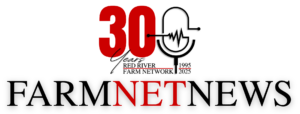
A Weekly Update from the Red River Farm Network
Monday, January 08, 2024

New Affiliate Joins RRFN – The Red River Farm Network welcomes our newest radio affiliate, KWOA AM 730, Worthington, Minnesota. KWOA covers southwest Minnesota, northwest Iowa and southeast South Dakota. Welcome to the RRFN family! RRFN champions hometown radio stations that understand the value of serving their community and the importance of agriculture. The RRFN team is proud to serve some of the best farmers in world. Go online to see RRFN’s entire roster of radio partners.
Warning Issued to Houthi Rebels – The United States is part of a coalition demanding the Houthi rebels stop their attacks on ships moving through the Red Sea. A joint statement has been issued by 13 countries, including Canada, Australia, Japan and the United Kingdom. The statement said the ongoing attacks “are illegal, unacceptable and profoundly destabilizing.” The coalition said this was their final warning. The Iranian-backed Houthis have been attacking commercial shipments to support Palestine in their war with Israel. There have been 25 attacks in the past two months.

Just-in-Time Delivery Influenced by Red Sea Conflict – With security issues on the Red Sea, major shippers are rerouting around the southern tip of Africa. NDSU Extension Crops Economist Frayne Olson is watching freight rates shoot higher. Shipping delays are happening. “A lot of the buyers are just-in-time delivery people,” said Olson. “They don’t want to pay for a lot of high inventory costs so they count on a very reliable supply chain to to deliver their product on time and at a reasonable price.” A common route for container ships is through the Mediterranean Sea and Suez Canal to China. That has changed for the short term with the conflict on the Red Sea. Olson says that creates opportunities for shipments out of the Pacific Northwest. Olson was part of the program Wednesday at the Lake Region Extension Roundup.
A Series of Baby Black Swan Events – Advance Trading Risk Management Advisor Tommy Grisafi describes this past year as a time that was marked by a series of baby black swan events. The smart people will never be able to predict a drone strike on a ship going through an important area because you can’t predict geopolitics,” said Grisafi. “In my career as a commodity trader and broker, I’ve never seen things as much tension in the world, if you were hoping for peace and prosperity in 2023, this was not the year.”

Russian Wheat Has Weighed Down Global Markets – North Dakota Wheat Commission Policy and Marketing Director Jim Peterson describes the current markets as “sluggish and a little fatigued.” During his appearance at the Lake Region Extension Roundup, Peterson said domestic and export demand for spring wheat is decent. “The big gorilla in the room is the incredibly cheap Russian wheat prices that set the floor for everything.” This fall, U.S. spring wheat had a $3 per bushel premium to Russian wheat for a comparable quality. That has narrowed closer to a $2 per bushel premium. Peterson remains optimistic “With the conflict in the Middle East, I think there’s going to be some customers who will look to spread out their sourcing so they don’t get caught short.”
No Timeline for Interest Rate Cuts – The minutes from the mid-December Federal Reserve Open Market Committee meeting have been released. They indicate some Fed officials were worried about leaving interest rates elevated for too long. Others said the situation may warrant keeping the target rate at its current level for longer than expected. The minutes did not offer any insight into the timeline for lowering the benchmark interest rate.
Balancing the Books – Farmers are closing the books on 2023 and planning for the year ahead. University of Minnesota Extension Agricultural Business Management Specialist Garen Paulson leads the Southwest Minnesota Farm Business Management Association and says many producers had an average crop this past year. “The 2023 crop was probably some of the most expensive corn and soybeans our producers have ever grown,” said Paulson. “Those that did some margin management and got some corn sold when they were buying inputs are probably going to see some real dividends.” Interest rates are a bigger factor on the balance sheets this year. Listen to the full conversation with Garen Paulson here.
Evaluating Transportation Costs – Compared to one year ago, third quarter transportation costs for shipping corn and soybeans declined through the Pacific Northwest and the Gulf. The USDA Grain Transportation Report indicates these costs dropped from the second to third quarter through the PNW, but increased through the Gulf. Low water levels on the Mississippi River resulted in a 104 percent increase in barge rates. Due to a sizable decline in truck and ocean rates, year-to-year transportation costs for the PNW fell 17 percent for corn and 16 percent for soybeans.
Most Expect Farmland Values to Moderate – According to the latest CME Group/Purdue University Ag Economy Barometer, fewer farmers expect farmland values will increase in 2024. Two years ago, six percent of those surveyed expected farmland values to decline. About 14 percent expect a decline this year. “Sentiment is cautiously optimistic, but certainly less confident than it was compared to two years ago,” said Jim Mintert, director, Purdue University Center for Commercial Agriculture. Farmers feel now is a better time to invest in new ag equipment because inventories are better. “The implication is that maybe they can do a better job of negotiating a deal.” Listen to the full interview with Jim Mintert here.
House, Senate Leaders Approve Spending Package – A $1.6 trillion spending package is on the table as the House and Senate return from their holiday break. Congressional leadership announced a bipartisan deal over the weekend. This is a framework agreement and lawmakers have less than two weeks to do the detail work. The government will run out of money on January 19 for USDA and three other agencies. The deadline for the rest of the government is February 2. The agriculture appropriations bill failed in a House vote in September due to language dealing with the Food and Drug Administration and the availability of an abortion pill.
Border Influences All Debate in DC – Russell Group President Randy Russell expects the border situation to influence any major policy debate in Congress, including the farm bill. “Funding the government for the rest of the year is priority number one.” If that can be accomplished with the new framework agreement, Russell said House Agriculture Committee Chair Glenn ‘GT’ Thompson will have the farm bill ready for markup by the end of February. Click here for the full interview with Randy Russell.
House Expected to Vote on Russian Bill This Week – With Congress returning to Washington, D.C. this week, a bill called the ‘No Russian Agriculture Act’ is expected to see floor action in the House. This bill would instruct the Treasury Department to pressure international financial institutions, like the World Bank, to reduce their reliance on Russia for ag commodities. Fertilizer and grain are specifically mentioned in the bill. California Democrat Maxine Waters and Iowa Republican Zach Nunn are cosponsors for this bill.
A Busy Week for Reports – The markets will be digesting a lot of economic data this week. The Commerce Department will shed light on the trade deficit Tuesday. CONAB will release the Brazilian crop production estimates on Thursday, which will be followed by the USDA supply/demand report on Friday. USDA will also include grain stocks and the winter wheat seedings estimate in Friday’s report.
What’s Hot, What’s Not in the Markets – In this week’s edition of What’s Hot, What’s Not in the Markets, Martinson Ag Risk Management President Randy Martinson cites gold, the dollar and cattle markets as ‘hot.’ On the other side of the ledger, Martinson said the grains are under pressure. “Demand is not there which was evident in last week’s export sales numbers.”
A Change in the Weather – A major storm is brewing in the Central Plains and portions of the Midwest. Three-to-nine inches of snow is forecast from Kansas and Nebraska to Michigan and Wisconsin. Localized areas may see more than a foot of snow from this system. Southwest Minnesota and southeast South Dakota can expect four-to-eight inches of snow. Much lighter snowfall amounts are forecast in the Northern Plains and Upper Midwest with totals closer to one-to-four inches. Subzero temps are expected at the end of the week. World Weather Incorporated says northern North Dakota and northern Montana will see extremes at 20 below and colder.
Acreage Decisions Continue – With the diverse mix of crops grown in the Red River Valley, there are many choices for the farmer. Corteva Territory Manager Jordan Grundstrom believes acreage decisions are still being made. “I think wheat is going to win some acres while (sun) flowers are going to be dramatically down,” said Grundstrom. “Soybeans look wildly popular today and I think corn is going to be a Mother Nature decision at planting time.”
Corn Matters – The Minnesota Corn Growers Association Let’s Talk Crops webinar series begins Wednesday. University of Minnesota Extension Educator Liz Stahl joins Corn Matters this week to give the details.

Prepay Levels Down From One Year Ago – According to Bayer CropScience Field Service Representative Brett Sauer, farmers were quick to lock in their seed corn during the fourth quarter. “Prepays have been pretty good this year, but I think they were a little stronger last year,” said Sauer. “It seems like the incomes were a little better in 2022 than they were in ’23 so there was a little less prepay this year. The early order pace usually comes pretty early on corn and soybeans will still get some spring business.” Sauer focuses on Rea Hybrids, which is part of the Channel seed brand.
Canola Minute – Here’s the latest Canola Minute from the Northern Canola Growers Association. This week, Northern Canola Growers Association Executive Director Barry Coleman reflects on the record breaking 2023 growing season.
Managing Scab – Speaking at the Lake Region Extension Roundup, NDSU Extension Plant Pathologist Andrew Friskop said wheat scab was prevalent in different areas last year. “When somebody asks me about our biggest fusarium head blight area? No-brainer, it would always be northeast North Dakota, but last year it was southwest North Dakota,” said Friskop. “It’s what the environment is doing in that three-week timeframe.”
Register for NCI Cereal Innovator Webinar – The Northern Crops Institute is hosting a Cereal Innovators webinar on Wednesday at 9 AM. This webinar will feature Horata Jarocka, a principal analyst at Mintel. The webinar will focus on the future of the bread, bakery and cakes. For more information and to register, go online.

Fighting Back Against Drought – During the Lake Region Extension Roundup, NDSU Extension agronomist Claire Keene shared information on the ongoing drought and how farmers can reduce its impact on their crops. “A strategy that farmers can take is to use some lower water-use crops. Spring wheat, barley, oats, peas (and) lentils might provide an opportunity to grow a crop that needs less water,” Deep-rooted crops can access deeper water levels and is another effective way to minimize the effects of drought.
Open Winter May Impact Some Crop Diseases – According to North Dakota State University Extension Plant Pathologist Sam Markell, an open winter can influence crop disease. “The snow will help protect and help insulate so if you have an open winter and it is 30 below, that can knock out a few things. It doesn’t matter with things like white mold, it’s going to survive.”
EATS Bill Will Be Reintroduced – Iowa Senator Chuck Grassley is reintroducing the Ending Agriculture Trade Suppression or EATS Act. This proposal would undo California’s Proposition 12 legislation that limits the confinement of breeding pigs, veal calves, and egg-laying hens. Grassley said the California law will hurt the farm economy.
Federal Order Reform Hearing to Resume – USDA will reconvene its public hearing to consider changes to the federal milk marketing orders on January 16. This hearing process began in late August near Indianapolis. Significant changes have not been made to the federal orders in more than 20 years.
Optimism for Milk Pricing Reform – Menahga, Minnesota dairy farmer Kristine Spadgenske testified during the federal milk marketing order hearing in September and is excited about the continued interest in this process. “It means that people care,” said Spadgenske. “We’ve had a record number of dairy farmers who have testified. The USDA is listening to these proposed changes and that’s a good thing.” Compromises will be necessary, but Spadgenske is optimistic about potential improvements in federal orders.
DMC, DRP Offering a Lifeline – Dairy Margin Coverage and Dairy Revenue Protection programs have blunted the pain of $15 Class III milk. Ever Ag Insights President Phil Plourd says these programs have had a major impact. “The bottom line is that the steady stream of DMC payments this year has been a lifeline for a lot of small-to-medium-size producers,” said Plourd. “And if you look at the DRP program on top of that, it paid out more than $400 million through Q3 in net indemnities. For producers using that program, that’s also been a big help.” U.S. dairy export demand is stagnant. Domestic demand is also flat. “If you look at the three big pizza chains that report publicly, none of them had a good quarter in Q3. Consumer credit card debt is at all-time record levels so while things aren’t terrible, the consumer has gotten a little more conservative in this economic climate.” In Plourd’s view, all segments of the dairy industry struggled in 2023. The export outlook has the potential to improve, offering optimism as we get into 2024.
Carbon Neutral by 2050 – The dairy checkoff has established a goal for the dairy industry to be carbon neutral by 2050. Dairy Management Incorporated board member Charles Krause says dairy farmers are taking steps to become more efficient with 75 percent of milk produced committed to the dairy stewardship. “Every year, farmers become more efficient in what we do and more innovative,” said Krause. “We’re not all expected to make the big change and put digesters in, but it’s the little things we do every day that add up.” Krause farms at Buffalo, Minnesota Hear the full interview with Charles Krause here.
MN Beef Update – This week’s Minnesota Beef Update catches up with Minnesota Beef Council Director of Industry Relations Jon Dilworth where he highlights the events happening this month.
Winter Grazing – Grazing cattle late in the season can be a cost savings. NDSU Extension Rangeland Management Specialist Kevin Sedivec cites an issue for legumes. “Clover and alfalfa need that snow protection,” said Sedivec. “If you do graze those and they’re open, you’ll see a bigger chance of winter kill.” Cattle may struggle to consume enough forage from grazing if ice remains on grass through winter. Sedivec also cautions against overgrazing in the fall as it can stunt growth in the spring. Hear the full interview with Kevin Sedivec here.
NDSU Researchers Consider Livestock Efficiency – NDSU Research Animal Scientist Colin Tobin reports new facilities are being built to advance research. The North Dakota Legislature approved funding for a livestock support facility and smart feedlot facility. The monoslope building will house around 120 animals and will be equipped with smart feeder and smart water technologies. “We’ll be looking at how animals behave when they come to the feeder and what their preferences are,” said Tobin. These studies will look at the pecking order and how it is established in different groups of calves. These studies will also focus on how new technology could impact the feeders’ bottom line. Click here for the full interview with Colin Tobin.
AMBA Adds Three and Drops Three Recommended Varieties – The American Malting Barley Association has released its recommended list of barley varieties for 2024. The three additions are all two-row varieties. They include a two-row spring malting variety called BC Leandra and a two-row spring barley variety called ABI Raptor. A winter malting barley called Avalon was released by Virginia Tech. Three varieties were removed from the list. They are Innovation, Moravian 37 and ABI Growler.
Dry Bean Scene – In this week’s Dry Bean Scene, NDSU Extension Crops Economist Frayne Olson highlights the dry edible bean marketplace. The Dry Bean Scene is brought to you by the Northarvest Bean Growers Association.
Trucks and Tractors Block the Roads in Germany – German farmers are beginning a week of national protests with convoys of tractors and trucks blocking roads. The farm groups are upset with the government’s budget proposal to end the tax break on diesel fuel and vehicles. This blockade is happening during the same week as a proposed strike by the truck drivers’ union.
Noem to Kick Off Legislative Session – South Dakota Governor Kristi Noem will deliver her State of the State address Tuesday afternoon. In addition to the budget, the Legislature is expected to consider tax cuts and workforce issues.
Landowner Rights to be Discussed in Pierre – South Dakota Farmers Union lobbyist Mitch Richter says the carbon pipeline and private property rights are on the agenda during this legislative session. “Farmers Union is interested in preserving landowner rights and that will be one of our bigger issues as we go forward.” Richter feels water issues also need to be addressed.
SD Corn Comments – In this week’s edition of South Dakota Corn Comments, South Dakota Corn Growers Association President Dave Ellens provides a preview of the annual South Dakota Corn Conference.
California Proposes Tougher Low Carbon Fuel Standards – According to the Energy Information Administration, nearly all of the renewable diesel produced in the United States is used in California. The California Air Resources Board has a comment period open to consider changes to its low-carbon fuel standards. “They want to make deeper carbon intensity reductions of their transportation fuels,” said Chris Bliley, senior vice president of regulatory affairs, Growth Energy. “There are some provisions on the sustainability of feedstocks and they’re removing the current exemption for aviation fuel.” Bliley is concerned about the new standards and their impact on the renewable energy industry.
Rural Finance Authority Supports Beginning Farmers – The Minnesota Department of Agriculture is now accepting applications for its Beginning Farmer Tax Credit. For this year, the state has $4 million available, and the tax credits are funded on a first come, first served basis. In addition, beginning farmers are eligible for a tax credit of up to $1,500 for tuition in the Farm Business Management program.
MFBF Minute – The Minnesota Farm Bureau Leadership, Education, Advocacy and Promotion (LEAP) Conference is coming to Fargo in early February. Leadership Development Coordinator Rachael Peterson joins us for this week’s MFBF Minute.
Risk Management Training for the Underserved – USDA is making up to $3 million available to provide risk management training to underserved, small-scale, and organic farmers. Nonprofit groups and land grant universities can apply for these grants. The deadline for applications is March 4.
FAFSA Change Impacts Farmers and Small Businesses – An attempt to simplify the government’s student aid process could make college more costly for farm families. Thanks to an omnibus bill that passed this past year included the change in the FAFSA or Free Application for Federal Student Aid. Previously, there was an exemption for families for families who owned farms or small businesses. American Farm Bureau Federation Director of Government Affairs Dustin Sherer says that exemption is now gone. “The example that’s been given is for a farm that’s valued at about $1 million under the old rules that family would have been expected to pay about $7,600 towards the education under the old rules. Under the new rules, that same family would be responsible for more than $41,000 which essentially would take you out of the Pell Grant and federal and state aid programs and force most people to take out student loans.” The FAFSA change takes effect for the 2024-2025 school year. Legislation has been introduced in both chambers of Congress to reinstate this exemption.
Missouri Takes Action on Foreign Farmland Ownership – Missouri Governor Mike Parson signed an executive order banning China and other foreign adversaries from owning farmland within ten miles of a military facility. This issue began when China’s FuFeng Group announced plans to build a corn processing plant in Grand Forks. That proposal was shut down just over a year ago.
Northern Soy Marketing in Southeast Asia – A delegation of farmers and industry experts representing Northern Soy Marketing are in Vietnam this week for a series of meetings with international buyers. purchasers. After Vietnam, NSM will travel to Cambodia for another seminar. “We’re targeting markets that have significant potential for growth so we have an outlet for this increased crush capacity we’ll have here in the U.S.,” said Patrick O’Leary, NSM chairman. O’Leary farms at Benson, Minnesota.

A Message of Resiliency – Farming and ranching is a cyclical business and financial challenges are inevitable. NDSU Vice President of Agricultural Affairs Greg Lardy offered a message of resilience during his address at the Lake Region Extension Roundup. “I think it is really important for our audience to understand some of the foundational components around resiliency and how we best go about bouncing back from those adversities and challenges that we’re going to face; we don’t know when, but they’re going to come our way.” The presentation emphasized the importance of relationships and the ability to find gratitude in our daily lives. “Growing up, my mother suffered from depression and other mental illness challenges,” shared Lardy. “Being able to ask for and get the help you need for those sorts of things is really, really important.”
Hands-on ‘Stop the Bleed’ Trainings Scheduled – Stop the Bleed trainings will be taking place across North Dakota over the next three years. Grand Forks County Extension Agent Katelyn Landeis says these trainings are beneficial for rural communities. “Smaller towns that do have an ambulance or response team, they still might be 15 to 30 minutes out,” said Landeis. Grand Forks County will host a training this month. Individuals with medical backgrounds may qualify to become certified as an instructor for the program. Those interested in hosting a training in their community are encouraged to contact their local Extension agent. The full schedule can be found at ndsu.ag/stopthebleed.
Beet Stock Values – According to Acres & Shares owner, Jayson Menke, there were a half dozen American Crystal Sugar Company beet stock brokered sales last week totaling 90 shares for an average price of $5,420,83 per share.
Beet Seed Companies Announce Joint Venture Plans – The companies behind the Hilleshog, Maribo, SES VanderHave and Seedex sugarbeet seed brands are entering into a joint venture. DLF Seeds, which is based in the Denmark, owns the Hilleshog and Maribo seed companies. The SES VanderHave and Seedex brands are owned by Groupe Florimond Desprez, which is headquartered in France. In a statement, the two companies cited changes happening in the sugarbeet seed industry and the investment needed to rapidly develop technology and create value for farmers. The joint venture agreement is scheduled to take effect July 1.
Soil Intelligence Tops 1 Million Acres – EarthOptics has mapped and physically measured one million acres of farmland. The milestone was achieved with its SoilMapper platform. EarthOptics also measures carbon for grassland and rangeland acreage with 300,000 tons of sequestered carbon completed. “We’re mapping soil carbon, soil fertility, soil health and soil compaction,” said Lars Dyred, CEO. Typically, the data is used for carbon credit programs for companies like Microsoft and United Airlines that are buying credits to offset their emissions. “Almost every program that we’re working with comes with payments to the growers. We call it a ‘decomoditization’ where farmers are getting paid for not just what they grow, but how they grow it.” EarthOptics plans to at least double its mapped acres in 2024. EarthOptics was founded in 2018. In addition to its office in Minneapolis, the company has locations in North Carolina, Virginia and Arkansas.
Connected Climate Exchange Launched – The Trimble technology company has launched a carbon marketplace called the Connected Climate Exchange. This effort will link farmers to companies hoping to meet sustainability targets through a streamlined process to collect verified data. One roadblock for carbon programs has been the ability to aggregate data, but Trimble officials say it has been on the farm collecting data for decades.
Farming for the Future – The Minnesota Department of Agriculture is partnering with the Red River Farm Network and the Linder Farm Network to provide information on soil health events and topics. This week, a Swift County farmer joins Farming for the Future to share his farm’s conservation journey.
Beef Co-op Proposed in Central MN – Happy Dancing Turtle is a nonprofit organization based in Pine River, Minnesota. Conservation Outreach Specialist Jim Chamberlain says there is interest in forming a cooperative with beef producers to provide local markets with ground beef. “It fits in well with customer demand and the systems our cow-calf producers already have,” said Chamberlain. This could also add a premium to cull cow markets. An informational meeting will be held January 18. Click here to listen to the full conversation with Jim Chamberlain.
AURI Update – AURI will host a Webinar Wednesday with a session called ‘Enabling an Environment for Scaling Food Business. Learn about the Minnesota Department of Agriculture grant availability and successes in the industry. Hear more details in this week’s AURI Update.
Colorado Potato Beetle Control Approved – The EPA has approved a new bioinsecticide to control Colorado potato beetle. Calantha is produced by GreenLight Biosciences. Chemical pesticide resistance is estimated to cost U.S. agriculture billions of dollars each year and this bioinsecticide is described as an effective and easy-to-use alternative.
RRFN to Report From Potato Expo – Potato Expo is the largest conference and trade show for the potato industry. The event is being held this week in Austin, Texas and will highlight current trends, innovations and technology for the potato business. Red River Farm Network Farm Broadcaster Randy Koenen will report from Potato Expo.

North Dakotan Leads Limousin Group – A Karlsruhe, North Dakota rancher is the new president of the North American Limousin Foundation. Austin Hager was elected during the group’s annual meeting in Oklahoma City. Jerry Wulf of Morris, Minnesota is also a member of the NALF executive committee.
Jepson Honored at Weed Forum – Stark County Weed Officer Travis Jepson is the recipient of the North Dakota Weed Control Partner Award. Jepson is a past president of the North Dakota Weed Control Association. The award was presented at Wednesday’s Noxious Weed Forum in Bismarck.
NPPGA Announces a Change in Leadership – The Northland Potato Growers Association has announced Executive Director Donavon Johnson has left the organization. NPPGA Office and Finance Manager Jacey Kuersteiner has assumed all additional responsibilities in the interim.

Callahan Named NAFB Interim Executive Director – The National Association of Farm Broadcasting has named Colleen Callahan as its interim executive director. Most recently, Callahan was the director of the Illinois Department of Natural Resources. Before that, Callahan was the director of the Illinois Department of Rural Development and was the agribusiness director at WMBD Radio-TV in Peoria, Illinois. Callahan was president of the National Association of Farm Broadcasting in 2002 and was inducted into the NAFB Hall of Fame in 2011. Former NAFB Executive Director Tom Brand resigned at the end of the year. A search is underway for NAFB’s next executive director. Inquiries should be submitted to NAFB President Carah Hart.
PLI Class of 2024 Named – The National Pork Producers Council and National Pork Board have unveiled the Pork Leadership Institute’s Class of 2024. Nearly 20 pork industry leaders are part of this group including Madison Hokanson of Goodhue, Minnesota and Mark Fuoss of Armour, South Dakota.
Schmidt and Uhrig Added to Beef Checkoff Board – USDA has announced the appointment of 26 members to serve on the Cattlemen’s Beef Promotion and Research Board. The newly appointed members include Jason Schmidt of Medina, North Dakota and David Uhrig of Hermosa, South Dakota. They will serve a three-year term.
SD Beef Industry Leader Passes – Funeral services were held Tuesday for DeSmet, South Dakota beef industry booster Bob Montross. Montross, 76, was a founding board member of a nonprofit group called Beef Bucks. Beef Bucks are pre-paid checks that can be used to purchase beef at restaurants and supermarkets. Montross and his wife, Nancy, were inducted into the South Dakota Hall of Fame.
Last Week’s Trivia-Dick Clark hosted ABC’s New Year’s Rockin’ Eve from 1973-to-1999 and from 2001 through 2004. Former North Dakota State Farm Service Agency Director Aaron Krauter wins our weekly trivia challenge. Runner up honors belong to Paul Coppin of Valley United Co-op, Dennis Sabel of Minnesota Farm Bureau Federation, Ramsey County farmer Paul Becker and Stephanie Larson of Rose Oak British Whites. The ‘first 20’ rounds out with Todd Good of AgCountry Farm Credit Services, Kevin Schulz of The Farmer, Mark Mettler of PreferredOne Administrative Services, Jason Heen of Farm Credit Services of Mandan, Robert Byrnes of UM-Extension, Regan farmer Jim McCullough, Mark Haugland of the National Wheat Foundation, retired Pioneer Field Agronomist Clyde Tiffany, Kittson County farmer Theresia Gillie, Mohall farmer Gene Glessing, Keith Bjorneby of Lone Wolf Farms, Mike Trosen of Meadowland Farmers Co-op, Keith Rekow of Dairyland Seed, Sara O’Toole of O’Toole Seed, livestock nutrition consultant Bruce Trautman and Eric Mack of CHS.
This Week’s Trivia-In 1984, a fast food chain aired a commercial featuring three elderly ladies and the famous phrase ‘where’s the beef?’ What is the name of this restaurant chain? Send your answer to don@rrfn.com.
| Contact RRFN | Don Wick (701) 795-1315 |
Randy Koenen (701) 795-1315 |
Tyler Donaldson (701)-795-1315 |
Jamie Dickerman (701)-795-1315 |
| RRFN Affiliate Stations | |||
| Aberdeen, SD – 105.5 FM | Ada, MN – 106.5 FM | Bagley, MN – 96.7 FM | Bemidji, MN – 1300 AM |
| Benson, MN – 1290 AM | Bismarck, ND – 1270 AM | Bismarck, ND – 1270 AM | Casselton, ND – 103.9 FM |
| Crookston, MN – 1260 AM | Devils Lake, ND – 103.5 FM | Fergus Falls, MN – 1250 AM | Fosston, MN – 1480 AM |
| Glenwood, MN – 107.1 FM | Grafton, ND – 1340 AM | Jamestown, ND – 600 AM | Langdon, ND – 1080 AM |
| Mahnomen, MN – 101.5 FM | Mayville, ND – 105.5 FM | Roseau, MN – 102.1 FM | Rugby, ND – 1450 AM |
| Thief River Falls, MN – 1460 AM | Wadena, MN – 920 AM | Warroad, MN – 92.5 FM | Worthington, MN – 730 AM |
FarmNetNews is a production of the Red River Farm Network. RRFN is based in Grand Forks, North Dakota and provides news to farmers and ranchers across Minnesota, North Dakota and South Dakota.

- Follow RRFN on



